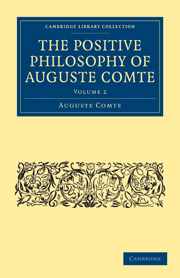Book contents
- Frontmatter
- Contents
- CHAPTER I NECESSITY AND OPPORTUNENESS OF THIS NEW SCIENCE
- CHAPTER II PRINCIPAL PHILOSOPHICAL ATTEMPTS TO CONSTITUTE A SOCIAL SCIENCE
- CHAPTER III CHARACTERISTICS OF THE POSITIVE METHOD IN ITS APPLICATION TO SOCIAL PHENOMENA
- CHAPTER IV RELATION OF SOCIOLOGY TO THE OTHER DEPARTMENTS OF POSITIVE PHILOSOPHY
- CHAPTER V SOCIAL STATICS, OR THEORY OF THE SPONTANEOUS ORDER OF HUMAN SOCIETY
- CHAPTER VI SOCIAL DYNAMICS; OR THEORY OF THE NATURAL PROGRESS OF HUMAN SOCIETY
- CHAPTER VII PREPARATION OF THE HISTORICAL QUESTION.—FIRST THEOLOGICAL PHASE: FETICHISM.—BEGINNING OF THE THEOLOGICAL AND MILITARY SYSTEM
- CHAPTER VIII SECOND PHASE: POLYTHEISM.—DEVELOPMENT OF THE THEOLOGICAL AND MILITARY SYSTEM
- CHAPTER IX AGE OF MONOTHEISM.—MODIFICATION OF THE THEOLOGICAL AND MILITARY SYSTEM
- CHAPTER X METAPHYSICAL STATE, AND CRITICAL PERIOD OF MODERN SOCIETY
- CHAPTER XI RISE OF THE ELEMENTS OF THE POSITIVE STATE.—PREPARATION FOR SOCIAL REORGANIZATION
- CHAPTER XII REVIEW OF THE REVOLUTIONARY CRISIS.—ASCERTAINMENT OF THE FINAL TENDENCY OF MODERN SOCIETY
- CHAPTER XIII FINAL ESTIMATE OF THE POSITIVE METHOD
- CHAPTER XIV ESTIMATE OF THE RESULTS OF POSITIVE DOCTRINE IN ITS PREPARATORY STAGE
- CHAPTER XV ESTIMATE OF THE FINAL ACTION OF THE POSITIVE PHILOSOPHY
CHAPTER XI - RISE OF THE ELEMENTS OF THE POSITIVE STATE.—PREPARATION FOR SOCIAL REORGANIZATION
Published online by Cambridge University Press: 29 August 2010
- Frontmatter
- Contents
- CHAPTER I NECESSITY AND OPPORTUNENESS OF THIS NEW SCIENCE
- CHAPTER II PRINCIPAL PHILOSOPHICAL ATTEMPTS TO CONSTITUTE A SOCIAL SCIENCE
- CHAPTER III CHARACTERISTICS OF THE POSITIVE METHOD IN ITS APPLICATION TO SOCIAL PHENOMENA
- CHAPTER IV RELATION OF SOCIOLOGY TO THE OTHER DEPARTMENTS OF POSITIVE PHILOSOPHY
- CHAPTER V SOCIAL STATICS, OR THEORY OF THE SPONTANEOUS ORDER OF HUMAN SOCIETY
- CHAPTER VI SOCIAL DYNAMICS; OR THEORY OF THE NATURAL PROGRESS OF HUMAN SOCIETY
- CHAPTER VII PREPARATION OF THE HISTORICAL QUESTION.—FIRST THEOLOGICAL PHASE: FETICHISM.—BEGINNING OF THE THEOLOGICAL AND MILITARY SYSTEM
- CHAPTER VIII SECOND PHASE: POLYTHEISM.—DEVELOPMENT OF THE THEOLOGICAL AND MILITARY SYSTEM
- CHAPTER IX AGE OF MONOTHEISM.—MODIFICATION OF THE THEOLOGICAL AND MILITARY SYSTEM
- CHAPTER X METAPHYSICAL STATE, AND CRITICAL PERIOD OF MODERN SOCIETY
- CHAPTER XI RISE OF THE ELEMENTS OF THE POSITIVE STATE.—PREPARATION FOR SOCIAL REORGANIZATION
- CHAPTER XII REVIEW OF THE REVOLUTIONARY CRISIS.—ASCERTAINMENT OF THE FINAL TENDENCY OF MODERN SOCIETY
- CHAPTER XIII FINAL ESTIMATE OF THE POSITIVE METHOD
- CHAPTER XIV ESTIMATE OF THE RESULTS OF POSITIVE DOCTRINE IN ITS PREPARATORY STAGE
- CHAPTER XV ESTIMATE OF THE FINAL ACTION OF THE POSITIVE PHILOSOPHY
Summary
We have finished the irksome task of observing the process of dissolution of the old system of society during the last five centuries; and we may now turn to the pleasanter consideration of the reorganizing movement which was going on at the same time.
Date of modern history.
In fixing the date of the beginning of the new social formation, we must remember that there is an interval between the generation of new social classes and the first manifestation of their tendencies. Considered in this way, it is the opening of the fourteenth century that we must fix upon as the time when the organic industry of modern society began to assume a characteristic quality. All the chief tokens of civilization indeed concur in marking that era as the true origin of modern history. The industrial expansion was then signalized by the universal legal admission of communities as general and permanent elements of the political system, not only in Italy, where it had happened some time before, but throughout Western Europe, where the event was sanctioned by various titles in England, France, Germany, and Spain; and the fact is marked and confirmed by the vast insurrections which, in almost every country, and especially in France and England, testified, during the second half of the century, to the nascent force of the labouring classes against the powers which were, in the respective cases, specially opposed to them. At the same period the great institution of paid armies was established in Italy; and they, marking a phase of industrial life among modern peoples, are as important in the organic as in the critical connection.
- Type
- Chapter
- Information
- The Positive Philosophy of Auguste Comte , pp. 363 - 433Publisher: Cambridge University PressPrint publication year: 2009First published in: 1853

